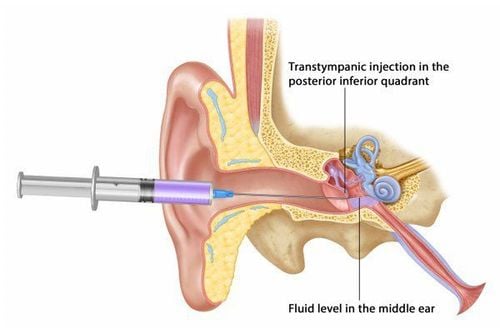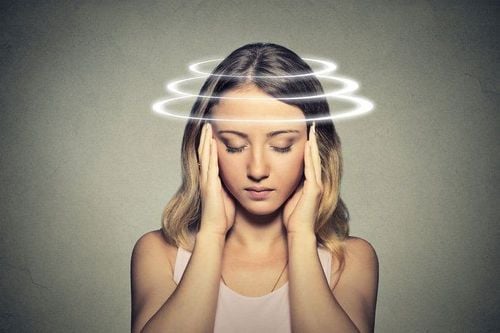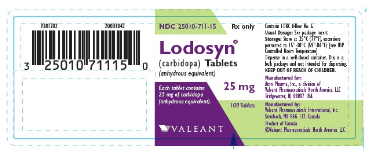This is an automatically translated article.
People with dizziness will have a feeling of spinning, dizziness and loss of balance. Dizziness can be a symptom alone or be part of another medical condition. The article below will help you learn more about dizziness, including potential causes, some treatments that you can apply.
1. What is balance vertigo?
Dizziness is a common feeling, patients feel suddenly dizzy, dizzy, lose their balance, themselves are spinning, as if their surroundings are spinning around them. Dizziness is not a disease but a symptom of a pre-existing condition. Many different conditions can cause dizziness. Dizziness can occur at any age, but is most common in people 65 years of age and older.
Dizziness is a symptom alone, but it can also occur with other symptoms such as:
Lightheadedness and loss of balance; Nausea and vomiting; Tinnitus ; Headache ; Eyeball tremors, dizziness, blurred vision; The body is pulled in one direction; Mentally unstable. Dizziness can last for various lengths of time, from a few seconds to a few days, depending on the cause. Usually, dizziness lasts a few seconds or minutes.

Bị choáng váng mất thăng bằng tiềm ẩn nhiều nguy cơ
2. Classification of Causes of Dizziness Various conditions can lead to dizziness, however it is usually divided into 2 categories:
Peripheral vertigo This type of vertigo accounts for about 80% of cases. Peripheral vertigo is often caused by problems in the inner ear.
Small organs in the inner ear that respond to gravity and human position by sending information via nerve signals to the brain. This process allows people to balance as they stand up. Changes to this system can cause dizziness and loss of balance. Benign paroxysmal positional vertigo and labyrinthitis or Meniere's disease are common causes of this type of vertigo.
Central vertigo Central vertigo is related to problems with the central nervous system. It usually originates from a problem in part of the brain stem or cerebellum. About 20% of cases of vertigo fall into this category. Possible causes include vestibular migraines, tumors involving the central nervous system.
3. Common causes of dizziness, loss of balance, labyrinthitis This condition can occur when an infection causes inflammation of the labyrinth of the inner ear, which contains the cochlear nerve. This nerve is responsible for transmitting information to the brain about head movement, position, and sound.
In addition to dizziness and loss of balance, people with labyrinthitis may experience hearing loss, ringing in the ears, headaches, ear pain, and vision changes.
8 cranial neuritis, vestibular branch Similar to labyrinthitis but does not affect the patient's hearing. Vestibular neuritis causing dizziness may be accompanied by blurred vision, severe nausea or a feeling of lightheadedness, loss of balance, ringing in the ears.
Cholesteatoma This is an abnormal skin growth in the middle ear that is not cancerous, usually due to repeated infections. When a cholesteatoma grows behind the eardrum, it can damage the bony structure of the middle ear, leading to hearing loss and dizziness.
Meniere's disease (labyrinthic fluid retention) Meniere's disease is caused by a buildup of fluid in the inner ear, which can lead to sudden dizziness with tinnitus and hearing loss. Meniere's disease tends to be more common in people aged 40–60 years. Meniere's disease is thought to have a genetic component because in some cases it occurs in more than one family member.

Bị choáng váng mất thăng bằng có thể do ứ nước mê nhĩ gây ra
Benign paroxysmal postural vertigo The ear organs are structures inside the inner ear that contain fluid and calcium carbonate crystals. In benign paroxysmal postural vertigo, these crystals separate and fall into the semicircular canals. There, each falling crystal touches the sensory hair cells during movement.
As a result, the brain receives incorrect information about the body's position and dizziness occurs. Usually the vertigo phase lasts less than 60 seconds, other symptoms such as nausea may be present.
Dizziness during pregnancy Nausea and dizziness are common problems during pregnancy. Hormonal changes lead to changes in the inner ear. This can cause balance problems, nausea and dizziness, ringing in the ears, difficulty hearing, a feeling of fullness in the ears. Changes in body weight and posture during pregnancy can also contribute to balance problems.
During pregnancy, a woman's blood pressure is often lower than normal, reducing blood flow to the brain. This may cause temporary dizziness. Low blood sugar or anemia during pregnancy may lead to dizziness more than others.
Other Causes of Dizziness stroke , cerebellar or brain stem disease, multiple sclerosis...
4. Treatment of vertigo with loss of balance Some types of vertigo resolve on their own as the body adapts without treatment. Prolonged dizziness with other symptoms such as vomiting, numbness of hands and feet, fever... or if you suspect that dizziness has an underlying cause, go to a medical facility for examination and treatment. To treat vertigo for patients, doctors base on determining the cause to have a reasonable treatment plan.
Most of the cases of dizziness and loss of balance can be cured by using medicine and balance exercises ... Besides, the doctor can apply the following treatment methods such as: rehabilitation Vestibular function combined with ICS Impulse system, ear stone repositioning procedure. If dizziness is caused by more serious causes such as tumors or trauma, surgery is indicated for definitive treatment.
Every patient can take home remedies to help resolve vertigo and limit its effects such as:
Lifestyle changes: Some ways that can help reduce the effects of vertigo include : Lie still in a quiet dark room when dizzy or off balance. Sit down as soon as you feel dizzy. Practice motions that trigger symptoms, such as standing up, looking up, or turning your head. Squat instead of bending over to pick something up. Sleep with your head elevated on 2 or more pillows. Turn on the lights when you wake up at night to avoid falling. Anyone with dizziness or loss of balance should not drive or use ladders. Proper diet: Avoid caffeine, chocolate, alcohol and don't smoke. Using foods rich in vitamin B6 helps improve dizziness and nausea. Do not eat salty foods, limit foods containing a lot of salt.
Dizziness and loss of balance can happen suddenly without warning. While episodes of vertigo can be scary, they go away quickly in a short time. If you are experiencing severe or persistent dizziness, your symptoms may be related to another medical condition. Your doctor helps you identify the root cause of your vertigo, choosing personalized treatment to help you get back to a normal life.
To protect health and prevent complications, when feeling dizzy and unbalanced for a long time, the patient needs to go to the hospital to be examined by a neurologist. Currently, Vinmec International General Hospital is one of the most prestigious medical treatment units for neurological diseases in Vietnam. The Department of Neurology at Vinmec has the function of examining, diagnosing, consulting and treating diseases related to neurological factors, including headaches, vestibular syndrome, cerebellar syndrome, dementia The typical method of the department is to use intravenous and arterial fibrinolytic drugs for stroke cases, along with the combination with paraclinical means such as electroencephalography, electromyography. ST Scan, MRI,...
Neurological examination at Vinmec, customers will receive:
Examination by a team of highly qualified and experienced specialists; State-of-the-art equipment, comparable to major hospitals in the world: The most modern operating room in the world; The most modern silent magnetic resonance imaging machine in Southeast Asia; the 16-sequence PET/CT and SPECT/CT systems help to detect the damage of the nervous system early even when there are no symptoms of the disease; Apply the most advanced intensive treatment techniques in the world in treatment.
Please dial HOTLINE for more information or register for an appointment HERE. Download MyVinmec app to make appointments faster and to manage your bookings easily.













